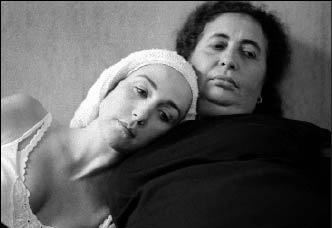Next story: The Nerves in Patterns on a Screen: Zoe Beloff's Charming Augustine
Torah and Tabu: La Petite Jérusalem
by George Sax

Somewhere around the middle of Karin Albou’s La Petite Jérusalem, one of the film’s two sisters asks the other, “Why does Hashem [God] send us desires he disapproves of?” and her sibling answers, “To test us.”
I had guessed her response before she uttered it, but not because I’m uncommonly acute or because this job prepares one to make good guesses. Jérusalem is the kind of tendentiously simple but vague film that clues you to such anticipation.
Set among a community of devout Sephardic Orthodox Jews in a working-class suburb of Paris, the movie obviously wants to be about the variously conflicting claims of faith and individual will, as these create individual and family stresses and confusion. But in its labored, low-key way, Jérusalem also seems confused, or at least too unfocused and incoherent.
The younger sister, Laura (Fanny Valette), is a subdued but increasingly discontented university student pursuing a philosophy degree. Her widowed, Tunisian emigré mother, who believes in the subsidiary traditional role of women and wives, expresses concerned disapproval: “Philosophy won’t fulfill you; philosophy won’t give you children!” Her elder sister reprovingly tells her, “You’ve been raised in the truth of the Torah.”
Laura persists in her own course, albeit with increasing anxiety and questions. She eschews the long-ordained North African Jewish head covering and costume worn by her sister and asks her family for money to rent her own apartment. She works after school in the cleaning crew at an elementary school, where she seems to have caught the attention of an Arab man, although she gives both him and us only the most obscure signal that she’s aware of this interest. Her sister, meanwhile, is having problems with her husband, and with reconciling her understanding of her religious instruction with free physical participation in her marriage.
Jérusalem also touches upon at least three other potential themes, including the problematic relations between the Jewish and Arab residents of France’s oppressively vast and dreary exurban industrial districts, but it never develops any of them to a satisfactory extent.
Albou has assembled her movie from clipped, abruptly ended, often repetitious scenes. She hasn’t dramatized material or shaped scenes and sequences so that the movie achieves a real thematic movement. Information is too often ill-communicated, even visually. When a synagogue is firebombed, it’s difficult to grasp this fact for a few moments because the sequence is so inadequately managed.
There are genuinely serious problems and interesting potential themes flitting around the edges of Jérusalem, but its drama is so unmoving that they don’t become clear or involving. When it does raise itself above its grey, subdued level of operation, it’s for briefly histrionic episodes.
A pall of seriousness hovers over the movie’s proceedings, but Jérusalem never illuminates or clarifies its somber attitude.
La Petite Jérusalem, part of the Emerging Cinema program at the Market Arcade, will run from April 28 to May 2.
|
Issue Navigation> Issue Index > v5n17: Power Failure (4/27/06) > Film Reviews > Torah and Tabu: La Petite Jérusalem This Week's Issue • Artvoice Daily • Artvoice TV • Events Calendar • Classifieds |









 Current Issue
Current Issue